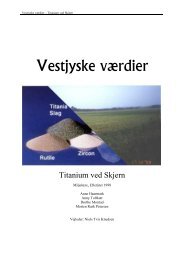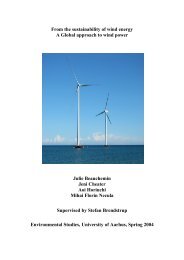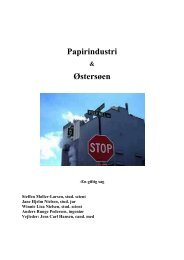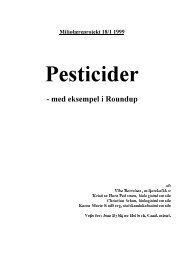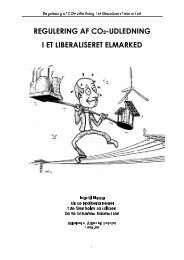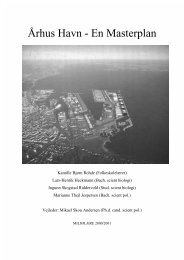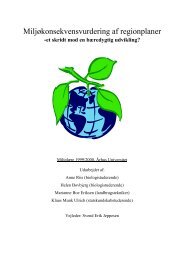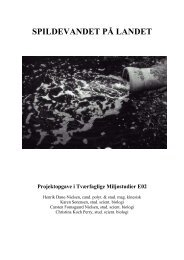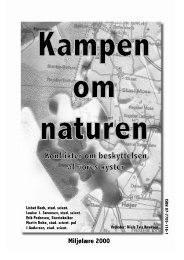University of Aarhus ECOTOURISM AS A WAY TO PROTECT ...
University of Aarhus ECOTOURISM AS A WAY TO PROTECT ...
University of Aarhus ECOTOURISM AS A WAY TO PROTECT ...
You also want an ePaper? Increase the reach of your titles
YUMPU automatically turns print PDFs into web optimized ePapers that Google loves.
Ecotourism as a sustainable way to protect nature<br />
Tourism is the world’s largest growth industry with no signs <strong>of</strong> slowing<br />
down in the 21st century (UNEP, 2002). (The peak was in the year 2000 - In the<br />
year 2001 there was a significant decline because <strong>of</strong> the terrorist attack on<br />
September 11).<br />
Proceeds from international tourism have increased by an average <strong>of</strong> 9 per<br />
cent annually for the past 16 years to reach US$476 billion in 2000. During the<br />
same period, international arrivals rose by a yearly average <strong>of</strong> 4.6 per cent to<br />
reach 698 million in 2000. W<strong>TO</strong> forecasts that international arrivals will top one<br />
billion by 2010. The W<strong>TO</strong> figures indicate that all the tourism activities account<br />
for over 4% <strong>of</strong> the Global GDP and that their combined direct or indirect<br />
contribution to global GDP are over 11%. Tourism-related activities provide<br />
200 million jobs (World Travel and Tourism Council, 2000).<br />
The W<strong>TO</strong> has estimated that "alternative" (nature based) (7) travels - <strong>of</strong><br />
which ecotourism is one <strong>of</strong> the forms - generated about 7% <strong>of</strong> all international<br />
travel expenditures in 1997. At the beginning <strong>of</strong> the 1990s the "alternative"<br />
(nature based) travel was growing at the rate <strong>of</strong> 10-30% per year (World<br />
Resources Institute/WRI, 1997). Others authors are approximately at the same<br />
level as Frangalli (1997), who proposes a rate <strong>of</strong> 20% per year. In 1995, the<br />
global value <strong>of</strong> ecotourism was estimated between US$ 17,5 millions (Fennell,<br />
1999) and US$ 25 millions and they expected the value to reach US$ 50<br />
millions by the year 2000 (Fennell, 1999).<br />
This increase in alternative tourism has been promoted by a broadening <strong>of</strong><br />
the clientele for ecotours and by an increase in independent non-group travel.<br />
These new clients are also more aware <strong>of</strong> the environmental and socio-<br />
7<br />
Alternative/nature-based tourism: in some literature the name "nature-based" tourism is used<br />
for tourism branches such as adventure, wildlife, ecotourism and so on. We prefer instead to<br />
use the name "alternative". This is because "nature-based" includes almost all kinds <strong>of</strong><br />
tourism, despite its mass, unsustainable, etc.<br />
18



